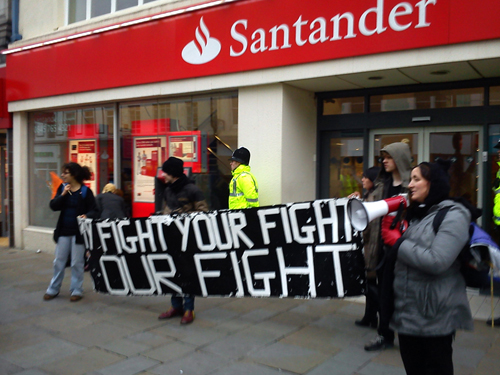
As expected, the public sector workers’ strike on 30 November against the attack on their pensions involved huge numbers: an estimated 2 million took part, and hundreds of thousands joined the demonstrations that took place in every major town and city across the country. 25,000 marched in London, 15,000 in Manchester, 12,000 in Liverpool alone.
The ruling class tried several tricks to reduce support for the strike. The government scrabbled around to find senior staff to fill immigration posts at airports, and offered former Border Agency staff 4 times the normal daily rate if they were prepared to cross picket lines. It threatened to withdraw its latest offer to the unions, one which it had claimed would not disadvantage anyone aged over 50. This was a clear appeal to a substantial proportion of public sector trade unionists.
Education Secretary Michael Gove spoke of ‘militants itching for a fight’, a theme the billionaire press took up with its attacks on union ‘militants’ and ‘bullies’. This had no noticeable influence on the numbers who did take strike action. The government then tried to belittle the strike’s significance and size. Prime Minister David Cameron described it as a ‘damp squib’, while the press repeated figures on the spread of the action which were patently untrue: for instance, that 40% of schools remained open when the Department of Education itself said only 13% were fully open, with a further 13% partly open.
However, public sector trade union leaders are not due to meet until 14 December to discuss further action, a guarantee that nothing will happen until the New Year, probably not until February. Yet the ruling class attack continues. On top of forcing public sector workers to pay higher contributions to their pensions for a worse return, Chancellor Osborne told the House of Commons the day before the strike that pay rises for the public sector will be capped at 1% per year from 2012 to 2014. This will follow a 2-years pay freeze. The combination of increased pension contributions, pay cap and rising inflation will mean real take-home pay for many public sector workers will be cut by 15% by 2014. 710,000 more public sector workers are forecast to lose their jobs over the next six years. The struggle over pensions has to be broadened to include resistance against all public sector and state welfare cuts
It is evident that the response of the trade union leadership does not begin to measure up to the scale of the ruling class assault, and that they are trying to find some shoddy deal. The Fire Brigades Union had already decided not to ballot on industrial action because it was prepared to accept a compromise offer on the fire brigades pensions scheme. The TUC is endorsing this sectionalism by recommending that unions hold separate negotiations on individual schemes – for NHS workers, civil servants and so on. It is anxious to ensure that the issue is settled as soon as possible in case it triggers struggles against massive council cuts in the New Year.
Labour Party leader Ed Miliband made it clear that he opposed the strike beforehand. Unite General Secretary Len McCluskey described this as a ‘mistake’ yet in the same breath argued that Miliband ‘deserves our support for the new path he is setting for the party (Morning Star 27 November 2011). Genuflecting to the left, McCluskey then declared ‘one thing we are not going to do is meekly accept that the next Labour government might do as little for us as the last one.’ But what does this mean? He has accepted Miliband’s opposition to the strike, and his union has accepted Labour council cuts which have cost tens of thousands of jobs and has now accepted Balfour Beatty’s successful court challenge to the ballot on the electricians’ strike. His many previous calls for campaigns of mass civil disobedience clearly amount to nothing. Trade union leaders had no relationship to the independent actions that did take place on 30 November: the occupation of Xstrata headquarters by OccupyLSX supporters, or the rolling demonstration in Hackney which led to a brutal police attack and 42 arrests. ‘Writing off the Labour Party’, McCluskey says, ‘leads us nowhere.’ But it does take us somewhere: it allows us to take a stand against Labour councils and describe them as what they are: class enemies who need to be fought tooth and nail.
What of the strike itself? True, it was huge, and the demonstrations were in some cases very large. Yet they were also at a low political level and did not go beyond the bounds set by the trade union leadership. The sound of whistles, drums and vuvuzelas substituted for political slogans, which when chanted amounted to little more than ‘Tories out’. Labour party leaders, where they spoke, were listened to without challenge. In Manchester, Labour council leader Sir Richard Leece, responsible for ruthless budget cuts, received a round of applause when he was mentioned on the platform. In Newcastle, the rally at the end of the march was in a derelict industrial estate outside the city centre where marchers had to endure 45 minutes of a band playing before any speeches were made. Socialist Worker’s headline on its strike special: ‘Millions go to war on the Tories’ was wishful thinking rather than a serious political assessment. The limited politics and actions of 30 November has confirmed that a trend within the working class determined to act independently of the Labour Party or the trade union leadership has yet to emerge. This is what is needed if we are to make a real challenge to the ruling class over the attack on state welfare, public sector pensions, jobs and service cuts.




